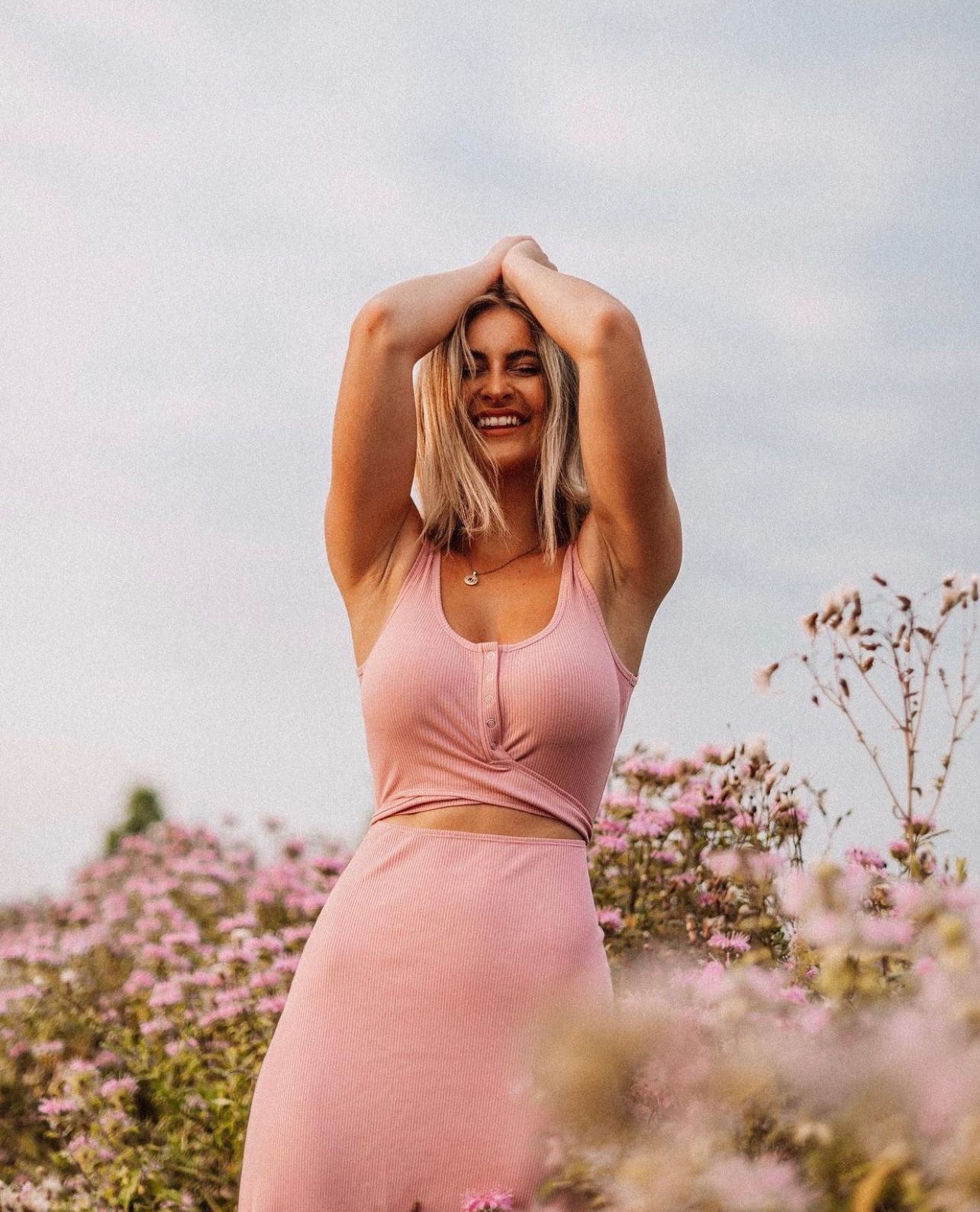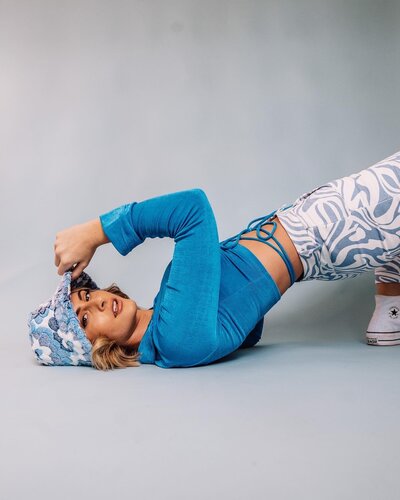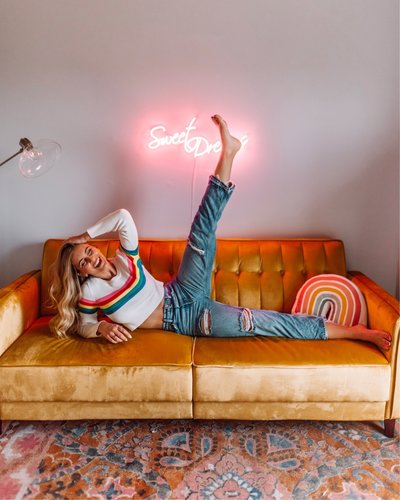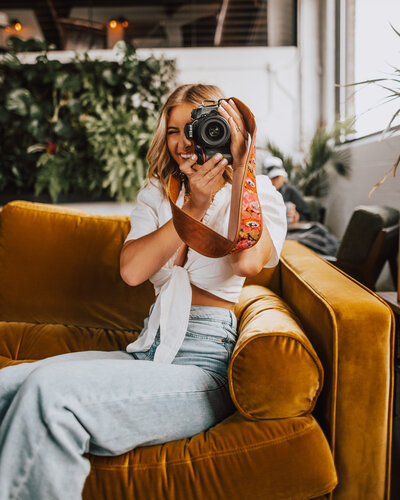Today I am opening up and getting super vulnerable with you guys— I am sharing why I went off the birth control pill a year ago even though I have absolutely no plans of having kids anytime soon.
I am sharing what this journey has been like for me and answering your most burning question of all— how do I avoid pregnancy since I am not on hormonal birth control.
Before jumping in, I do want to make a huge disclaimer: I am not a doctor— Today I am sharing from my PERSONAL experience, I am by no means giving medical advice. This is solely to bring awareness to the topic and share my own journey. Always consult with your own doctor before making changes to your lifestyle and health!
Also I want to say, I am NOT anti-hormonal birth control. The invention of things like the pill was one of the biggest advancements to ever happen to women in modern society. It allowed women to have a choice for their life & chase after their own dreams and aspirations if they wanted to. At the end of the day I am ALWAYS for women having a choice when it comes to their health & bodies, period.
I am sharing my story because I believe knowledge is power— being well informed about how your body works and being able to make a decision that is best for YOU most important.
Lastly, If you don’t want to read things about birth control, sex, mental health, etc. then feel free to skip this post! I think that covers everything So without further a do let’s jump on in babes!
Before we dive into the why, I think it’s important to share a timeline of my journey and experiences with hormonal birth control— let’s take a look:
◦ At the age of 15 or 16 I was put on birth control— Lo Loestrin Fe, because I suffered from extreme cramps and acne. I had a rocky start— my acne got worse and I became super depressed.
◦ I then was switched to Ortho Tri Cyclene— I LOVED this stuff and didn’t have issues for YEARS. For those of you who don’t know— I actually married my high school sweetheart, so not only was my acne clearing and my cramps were completely gone, but having it for actual birth control was nice too.
◦ Throughout what would have been my college years had I not dropped out— I was finding a ton of success online and things were really good, but slowly I noticed my sex drive was vanishing, which was very unlike me. I ignored it though and never even thought it could be my birth control.
◦ I also noticed I was getting SUPER irritated and was stressed to the max 24/7. In addition, I felt very bloated and uncomfortable all the time.
◦ Around July of 2019 they discontinued Ortho Tri Cyclene and I had to switch to the generic version which should have been the same, but I felt the side effects getting worse and worse.
◦ In December of 2019 I had my first panic attack— you can hear more about my experience with panic attacks on my Behind the Feed Podcast episode found here. This wasn’t just a one time thing— it was the beginning of a deep mental spiral that led me to the lowest period of my life.
◦ I switched my birth control to Yaz hoping maybe the previous switch had caused the issue, but my panic attacks persisted.
◦ I developed a panic disorder and generalized anxiety disorder. I finally got away from the weekly panic attacks, but the daily anxiety persisted for almost a year.
◦ In September of 2020 I was doing so deep digging about how I could improve my mental health and anxiety because I was desperate— I chose not to be medicated on anxiety medication because I know people who have had a terrible time on them and I really didn’t want MORE side effects on top of everything else I was experiencing.
* I am NOT anti-medicine. I’m vaccinated, I would go on medication if I ever needed to. HOWEVER, If I can avoid being on any type of daily medication and can make lifestyle adjustments instead, I would rather do that. This again is a personal preference. Most of the population is on some type of daily medication that improves their quality of life in some way and that is totally okay! You do you!
◦ Throughout my research I stumbled upon some interesting information correlating panic attacks and other mental illnesses, like anxiety and depression, to long-term hormonal birth control use.
◦ The first resource I found was by Sarah Chapman Hill— I found her on a few podcasts talking about this topic, which can be found here and here, as well as her book, This is Your Brain on Birth Control. There is a ton of fascinating and alarming information that she shares, but the big one that stuck out to me was the connection to panic attacks and anxiety. If you want all the details and facts, definitely check her book out or listen to some podcasts that she is featured in!
◦ This struck a chord in me— was this a possible underlying cause of what I was experiencing? At this point I was SO low energy all the time and I was DONE feeling this way.
◦ Then I began to research further— well, if I leave hormonal birth control behind, how will I prevent pregnancy? What will I do for birth control instead? Because TRUST me— I do not want kids anytime soon.
◦ Grant and I had gotten married a few months prior at this point, and kids was not something we wanted in our life at least for the next 10 years, and is something we still talk about if we want to have kids at all. So trust me when I say, the fear was there!
◦ I knew that you could only get pregnant about 5-7 days out of your cycle— if you didn’t know this, congratulations, now you do! I am always frustrated that women don’t know this about their bodies. In some schools and even churches, they teach girls that it is possible to get pregnant ANY day of your cycle— I think they do this to scare teens into not having sex, but in reality, it sets kids up for failure. I could go on a tangent all day long about how women deserve to KNOW how their body works.
◦ I began some more research and found out about the Fertility Awareness Method, which is something I had never heard of. This method is not to be confused with the Rhythm Method where you use an app and it tells you you’ll ovulate 14 of 28 days on your cycle. This method is extremely inaccurate and causes so many unwanted pregnancies because it doesn’t use your personal data! Not everyone’s cycle is 28 days and not everyone ovulates in the exact middle of their cycle. What if you ovulate on day 16, 17, or 18? Then you could think you are in the clear when in reality you are actually in the danger zone!
Now that we’ve gone over the timeline, here’s some of my findings and what’s worked for me:
◦ How Fertility Awareness Method works, is it uses three measurements to predict ovulation, and it is extremely accurate. It factors in the position of your cervix through your cycle, the type of discharge you have throughout your cycle, and your basal body temperature throughout your cycle. If you want an in-depth run down on how this works, check out the Fertility Friday Podcast! Lisa has so much valuable insight and even has programs that she offers as well.
◦ I want to focus solely on basal body temperature for a second— I found the app, Natural Cycles which tracks with a Red Day and Green Day System. The more you track, the more accurate it gets and the more Green Day’s you’ll get!
◦ You can use LH Tests and track your cervical position and discharge to confirm ovulation. I have a 31 day cycle and ovulate on day 17! Sometimes stress effects this, but I always know when I’m ovulating because of charting my basal temperature and taking LH Tests!
◦ I notice when my cycle changes and is different— lots of travel or extreme stress can impact this. It can impact when I ovulate, when my period’s coming— by tracking my cycle I know why my period is late or early, I know when I’m super stressed out I might ovulate a few days later and when that happens, my period starts a few days later, but it still starts like clockwork— the app is very accurate.
◦ Talking with your partner is important— this method might not be for everyone!
Let’s talk about the downsides to using the Fertility Awareness Method:
◦ If you get a terrible night’s sleep— if you’re a restless sleeper, your sleeping schedule is all over the place, or you just have a terrible time getting to sleep, you are probably going to have inaccurate numbers. Your basal temperature will probably be elevated for a random reason, so that’s something you are able to actually mark in the app— they will ask if you’ve had a bad nights sleep and they will not take your temperature into account in your overall numbers, because they no that it is an inaccurate reading.
◦ If you are sick— if you have a fever, if you don’t feel good, you can mark this in your app as well and it will void that entry for that day because you being sick will cause you to have inaccurate numbers as well.
◦ If you are hungover— if you’ve had a drink or two it doesn’t typically effect your numbers, or for me personally it hasn’t, but if you’re feeling hungover or if you’ve had a lot to drink the night before, that can also elevate your basal temperature and it will ask you to mark that in the app as well.
◦ This method might not be for you if you have multiple partners or sleep with different people all the time— if you are able to have an open conversation with each person and they can follow your method then great, but if you don’t want to run that risk, I definitely understand. It is definitely easiest to use the Fertility Awareness Method if you are in a monogamous relationship and you have good communication together.
So what about getting off the pill? Where do you even begin? When I first decided to go off of my hormonal birth control pill, there was a fear in the back of my mind of what would happen to me when I went off the pill— would my anxiety get worse, would my acne flair up?
I ended up finding resources from Dr. Jolene Brighten and I found a ton of podcasts with her on it— a couple of my favorites can be found here and here— and I also ordered her book, Beyond the Pill, and I was so intrigued by this! Her whole career is working to coach women through what to do when they make the decision to get off hormonal birth control— make them aware of the side effects, what might happen, more about Post Birth Control Syndrome— and I was just so fascinated! I felt equipped and I knew exactly what I needed to do because she had done it before and was now coaching me on how to do the same!
One thing I realized when listening to Dr. Jolene Brighten speak was, PMS is NOT natural! It’s not something that should be happening. I think a lot of times, growing up, we’re taught PMS is apart of being a women, it’s apart of having a period— you have to have PMS and if you don’t, you’re just lucky— that’s actually not the case! Mild symptoms are one thing— the occasional cramp, or getting a little irritated before your period starts— that’s fine, our bodies are changing, our hormones are fluctuating. But big PMS symptoms like severe cramps— debilitating where you’re to the point of passing out, extreme acne, migraines, etc. those aren’t natural, they’re not supposed to happen, and a lot of times they occur because you have a hormonal imbalance.
The reason hormonal birth control works and why doctors prescribe it is because it masks those problems, it gives you synthetic hormones which “balance” your hormones— which aren’t even real hormones, it’s all synthetic— and this is what makes it appear as if your problems go away— it makes your cramps go away, it improves your acne— and the reason it improves acne is because it reduces sebum production— so getting off of hormonal birth control, you often times produce an excessive amount of sebum, and that’s why your face can often times break out really bad, but it always goes back to normal.
What doctors often don’t realize is, when you go off hormonal birth control, the problems you were experiencing before you went on birth control will most likely still be there— it doesn’t just go away with hormonal birth control, it’s just a bandaid.
So a lot of times, if you’re not on hormonal birth control for birth control purposes, and you’re on it for acne or cramps, then it is definitely worth looking into some other options— there’s so many other ways to balance your hormones.
I know hormonal birth control can be great for people with endometriosis and things like that, so I’m definitely not saying everyone shouldn’t be on it— again, it’s great for the people that it works for, but if you’re on it just for acne, there are so many other methods you can go about addressing it— I know sometimes a quick fix just sounds nice, but Dr. Jolene Brighten and her book, Beyond the Pill, really does a good job talking about the signs of different hormonal imbalances, supplements you can take, diet and lifestyle changes you can make in order to balance your hormones again.
She also dives deep into Post Birth Control Syndrome, which is why so many people go off birth control and then immediately get right back on it a few months later, because they are terrified of what’s happening to them. So what exactly is Post Birth Control Syndrome? In short, it can cause anxiety, depression, severe acne, migraines, the list goes on and on, there are so many things that can happen— which definitely scared me when I first made the decision to get off hormonal birth control.
Beyond the Pill by Dr. Jolene Brighten helps you to make the necessary lifestyle changes a month or two before going off hormonal birth control that will set you up for success when coming off of it and lessen the blow of Post Birth Control Syndrome. It’s also important to note— these symptoms will go away, they are temporary, it’s your body trying to figure itself out again because your cycle hasn’t actually been happening for however long you’ve been on hormonal birth control— it’s been shut down. Hormonal birth control shuts down the brain to ovary connection and instead the synthetic hormones go in and run the cycle for you, then when you take those sugars pills, it’s withdrawal bleeding, it’s not an actual period— so your body is learning to be itself again.
So what has life been like since being off of the pill?
◦ Let me tell you what, for starters, my acne has not been the best over the past year, but now, after hitting the year mark, my acne is actually better than it ever was in my teen years. I feel fully balanced now and I really do appreciate all the knowledge from Dr. Jolene Brighten’s book and podcasts because it truly helped me so much and helped me understand myself. But I did definitely notice some breakouts that I would not have had had I not gone off the pill.
◦ I also experienced a few migraines after getting off the pill— which I had never had a migraine in my life— but they did go away. This all happened within a few months of getting off the pill, which was honestly the worst of it, then I really began to feel like I was on top of my own health.
◦ It took me about a full cycle, but the craziest thing started to happen to me— I felt alive again! It was weird because I didn’t even realize the way I was fully feeling until I wasn’t feeling that way anymore— I don’t know how to fully describe this to someone, but it felt like I was living life with yellow tinted glasses on and suddenly I just took them off… and I was like, wait— holy shit! I felt vibrant— I felt like me again for the first time in years. I never even realized I wasn’t feeling like me. That was the biggest, most rewarding thing coming off of hormonal birth control for me. I immediately felt so excited about life— I felt human again!
◦ My sex drive came back and I began to feel good, feel better.
◦ I was so afraid my extreme cramps would return— I was pleasantly surprised that they actually haven’t been that bad since going off of the pill. There have been a few times I’ve had to soak in a bath because they’ve been bad, but nothing nearly to the extreme I had experienced— it’s not debilitating for me anymore.
◦ Also, there’s this really great supplement, Semaine, that is for period health that is designed to aid with cramps and PMS that has been really great, as well as Ovamoon that I really love that was recommended to me, which is more of a hormonal cycle balancing supplement. Both of which have helped me a lot!
◦ As far as anxiety and panic attacks go, in the beginning it was a little bit rough, I am not going to lie, it was a rough Winter. But around the six month mark, I just noticed a HUGE shift— and now for the past six months, I’ve nearly had no anxiety. I’ve felt like I’m finally myself again! Don’t get me wrong, my anxiety is not completely gone— a lot of the anxiety and panic attacks I experience now are related to triggers in my life— I actually had a panic attack not too long ago, it was solely caused by a very triggering event that happened, but I was able to deal with it and get over it and move on. I just no longer feel like anxiety or panic attacks are dictating or controlling my life— it comes, it goes, but it’s no longer this everyday occurrence, I no longer feel like my cortisol is through the roof, in constant fight or flight mode— I feel like me again!
Lastly, I want to dive into something that was absolutely fascinating to me and helped me to ensure I was on my A game throughout my cycle, and that is the idea of syncing your lifestyle to your menstrual cycle.
You may be shocked to know this, but us as women, we are on cyclical cycles— we are cyclical beings. A person who is biologically, born a male is on a daily cycle— they feel the same every single day. But a person who is biologically, born a female is on a cyclical cycle— this means that our hormones fluctuate, everyday is not going to feel the same for us. We live in a society though that runs on a daily cycle and is not wired at all for a cyclical cycle and everyone’s on a different part of their cycle so it’s hard to balance that.
But knowing this about yourself can be really powerful— for example, at the end of your menstrual cycle, you will not be at you peak performance. If you were to be competing in something physically at the gym, at the end of your menstrual cycle, you’re not going to be on your A game. But during ovulation, that is the time to max out, do your PR’s, get shit done— during the end of your menstrual cycle, you’re actually more prone to injury, it’s crazy! That’s all because our hormones fluctuate.
The podcast Flow with Berrion Berry is a great podcast that actually talks about how you can sync your lifestyle to your menstrual cycle, if you are interested in learning more about that, I definitely recommend checking her out!
In addition, Optimize Your Flo on Instagram really breaks down the four parts of your cycle and what you should be doing each week of that cycle— just to give you an idea of what I mean when I say sync your lifestyle to your cycle:
IDEATION: The beginning of your cycle is your period (usually days 1-5). This is time to brainstorm new ideas because there is more brain connectivity happening between the left and right hemispheres of the brain.
CREATION: The follicular phase (usually days 6-10). Time to strategically plan things— break down how you want those ideas to happen. This is where you are regaining strength and energy as estrogen & FHS increase. You will be feeling back to normal.
EXECUTION: Week of ovulation (usually days 11-18). This is where you get your shit DONE! Take action on all the things you dreamt up and outlined! This is when you’ll have the most energy throughout your cycle. This is because estrogen and LH are at it’s peak.
EVALUATION: (usually days 19-28) Typically when people begin to PMS. Progesterone is high and estrogen is low so you may feel irritated or annoyed. You are great at pinpointing problems during this phase take time to evaluate what’s working and what isn’t. Be easy on yourself, don’t push yourself too hard.
Syncing your lifestyle to your cycle only works if you are having a natural period and menstrual cycle— this will not work for you if you are taking hormonal birth control and the synthetic hormones are putting your body on a daily cycle rather than a cyclical cycle.
I know I just threw a TON of info your way. Again, I am not a doctor and I am not advising you on what to do with your body. If you are happy with your birth control method that is great! This post was for the person out there who isn’t happy, the person looking for another solution, the person who is seeking another viewpoint.
If that is you, hopefully this helped you in some way. If this sounds like something you want to look into I encourage you to do your own research as well. You can also talk to your gynecologist about this as well— And remember your health care provider should be your ally. If you are unhappy with your health, your doctor should advocate for you. If they make you feel like their is only one solution to your problems than you can always find a new doctor that listens to your concerns!
You can always DM me if you have any deeper questions about my personal experience. Again, I am not here to tell you what to do with your life, but I can most certainly share my experience with you!









